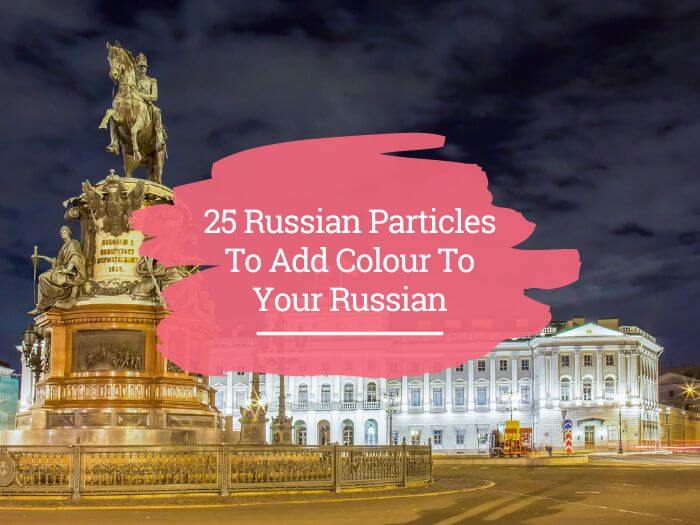When you learn Russian, particles are some of the fuzziest words to deal with as they don’t have a meaning on their own. In fact, the main job of a particle is to give nuance to the words around them.
However, they don’t describe an adjective like an adverb and they don’t explain an action, like a verb. Known as части́цы in Russian, Russian particles give nuance and subtle shades of meaning to other words.
On top of that, частицы are a big part of the Russian language and get used in almost every kind of speech and writing, so it’s important to know about them. With that in mind, this article is all about Russian particles and will answer questions like:
- What is a particle?
- What do particles do?
- Where do particles go?
- What are the most common Russian particles
By the end of this post, you'll know how to use 25 Russian particles like a pro!
Pro Tip
By the way, if you want to learn Russian fast (including Russian particles!) and have fun, my top recommendation is Russian Uncovered which teaches you through StoryLearning®.
With Russian Uncovered you’ll use my unique StoryLearning® method to learn Russian through story… not rules. It’s as fun as it is effective. If you’re ready to get started, click here for a 7-day FREE trial.
You can jump to the section of the post that interests you most using the table of contents below.
Table of Contents
What Are Russian Particles?

A particle is a kind of word that’s wholly dependent on others since a particle can't stand on its own and has no meaning on its own. You can think of particles as the spices or flavouring to a sentence as opposed to the main dish.
Think about the English words like “though”, “even” and “well.”
- Well, you don’t even really know if it’s true though.
You could take these out of a sentence and it would still make sense. That being said, you can tell that the sentence feels different. Words like “even” and “though” add nuance regarding the speaker’s feelings and perspective.
- You don’t really know if it’s true.
And this feeling is the essence of particles as they add shades of meaning to words and phrases. And occasionally these частицы give the listener useful grammatical information.
By adding these meanings, a particle’s role can sometimes overlap with adverbs, interjections, and conjunctions. In fact, particles are very often derived from another word class like adverbs and conjunctions.
So what about Russian particles?
Broadly speaking, you can put Russian particles into one of two categories. The first kind are grammatical particles and serve a specific role, often in forming different tenses or moods.
These have strict functions and are more straightforward for you to get your head around.
The other group are the semantic particles (смысловые частицы in Russian) which add shades of meaning and нюанс (nuance) to a sentence. Oftentimes, these kinds of particles will give a phrase its emotional colouring and tone.
In other words, they express the speaker's beliefs like whether they doubt something, think it’s likely or not, or if it’s desired or not. They can also add emotional content such as surprise, support, enthusiasm, or dismissal.
As tempting as it might be, it’s best not to try and come up with translations for semantic particles.
Like Russian conjunctions and adverbs, Russian particles don’t conjugate, decline, or change to match grammatical categories. A few particles do change based on sounds (like a/an in English) but these are only minor alterations.
Where Do You Put Russian Particles?

There’s no simple way to know where a particle goes without some experience.
Some like ну and пусть always come at the beginning of a phrase, while others like -ка and -то always come after the words they add nuance to.
And a small number of particles like ведь can be found almost anywhere in a sentence.
While that might sound complex at first, a lot of these positions will seem natural, especially if you follow the rules of StoryLearning and read books in Russian. And, of course, I'll explain the more complicated Russian particles in detail.
Russian Semantic Particles
1. Ну – Well, All Right
One of the first particles you might already know is the Russian word ну. It’s also one of the only Russian particles that translate well into English.
- ну устала (Well I’m tired.)
- ну скажи (Well, say it/all right, say it.)
2. A – Right (Expected Agreement)
At the end of a sentence the particle a asks the listener for an answer, usually an agreement.
- он дома, а? (He's at home, right?)
At the beginning of a sentence a functions like an introduction to a thought. It’s a bit like “well” or “so” in English.
- а он дома (So he’s home.)
3. Вот – Here Is, There Is, That’s
- вот мой дом (Here’s my house/that’s my house.)
- вот где он живет (There’s where I live.)
- вот почему есть проблема (That’s why there’s a problem.)
Вот can also be used to show amazement and indignation.
- вот подлец (What a cheat!)
- вот подонок (What a scoundrel!)
4. Ведь – Since, After All, You Know?
The particle ведь is used to introduce or explain something that’s obvious or self-evident. It can sometimes be translated as “you know?” Used this way, it comes at the beginning of a phrase
- Ведь ночью люди спят (People sleep at night, you know?/You know, people sleep at night.)
Likewise, ведь can be used for confirmation.
- Ведь ты пойдешь на вечеринку (You’re going to the party, right?)
It can also be used to explain something. In this case, it comes in the middle of a phrase.
- Я имею готовить, работал ведь поваром (I know how to cook, since I did work as a chef.)

5. Было – About To, Going To
- Наташа поехала было, но заболела (Natasha was about to go, but she got sick.)
- он спросил было, но передумал (He was going to ask, but he changed his mind.)
Since было expresses an action that has been interrupted, it’s almost always paired with a verb in the imperfective aspect.
6. И – Do, Does, Is (Adding Emphasis)
The particle и puts emphasis on the word that comes after it.
- он и старается (He is trying/He does try.)
- я и прочитал книгу (I did read the book.)
- так и есть (So it is.)
7. Да – Emphasis And Support
No doubt if you’re studying Russian then you already know the word да. If you’re asked a yes-or-no question like хочешь кофе (do you want coffee?), you can answer with a simple да and get your cup filled.
It’s important to know that да also has a different role as a particle. It comes up when supporting an action.
- да здравствует король (Long live the king.)
- да будет свет (Let there be light.)
- да будет так (So be it.)
You can also use it to show emphasis, like this:
- да я не знаю (I really don’t know.)
- да забудь об этом (Just forget about it.)
8. Даже – Even
- Я даже не знаю что случилось (I don’t even know what happened.)
- даже в хорошем качестве… (Even in good quality.)
9. Же – Emphasis

The particle же will probably cause some of the biggest confusion for you as a learner because of its enormous range.
It’s known as a усилительная частица (strengthening particle) and the primary thing you’ll see же being used for is to put emphasis or stress on an idea.
Look at the difference between phrases with and without же
- я молчу (I’m not saying anything.)
- я же молчу (I myself am not saying anything/As for me, I’m not saying anything.)
- где живут (Where do they live?)
- где же живут (Where do they live then?/Where exactly do they live?)
Overall, it’s hard to give a precise meaning to же but it can add emphasis to almost any word.
- ты же обещал (But you promised!/You had promised!/You did promise!)
- это же Алматы (This is Altmaty/This is Almaty, after all/This is Almaty, you know.)
- сейчас же сделай (Do it right now.)
You’ll sometimes see же shortened to ж, especially after the word что.
- что ж? (Well, what then?)
- что ж делать? (What is to be done?)
You might also recognize the word же as part of the construction for saying that something is the same. This happens when же is paired with different forms of этот, тот and такой.
- та же машина (The (very) same car.)
- купил такую же книгу (He bought the (exact) same book.)
10. -То – Emphasis
The particle -то is a suffix that works much like же, but is a bit more colloquial and familiar. Nevertheless, it gets used quite regularly so it's a good one for you to learn.
- Это не так-то просто (It’s not just as easy as that.)
- Я в ресторане-то не была (I wasn’t even in the restaurant.)
- Вам-то чего бояться? (What do you have to be afraid of?)
- Теперь-то я понял главный пункт (And now I understand the main point.)
11. -Ка – Softening Commands, Expressing Resolve
Like -то, this is one of the few particles that’s not a stand-alone word, but acts more like a suffix. The particle -ка is used when softening a command.
- дай-ка книгу (Give me the book (please)/Could you give me the book?)
- послушай-ка (Now listen up.)
When -ка is attached to a verb in the first person, it shows a mild sense of desire or resolve to do something.
- напишу-ка я песню (I think I’ll write a song.)
- пойду-ка я один (I think I’ll go alone/I’d prefer to go alone.)

12. Разве – Really?
This particle is used when the speaker is anticipating a negative answer.
- разве он позвонит завтра (Is he really calling tomorrow?)
- разве ты не знаешь (Don’t you know?)
13. Таки – Still, After All
- Она таки была там (She was there after all.)
- Он таки прав (He’s still right/Still, he’s right.)
The particle таки is considered somewhat colloquial compared to the particle всё-таки.
14. Всё-таки – Nevertheless, In The End, All The Same, Really, Finally
- Холодно? Это зима всё-таки (Cold? Well, it’s winter after all!)
- Сомнение всё-таки остается (Doubt remains nevertheless/Doubt does still remain.)
15. Уж – Really, Definitely, Certainly
- ты бы уж вернулась (You really should have come back.)
- уж он узнает (He’s definitely going to find out.)
- уж не пойду (I (really) am not going.)
16. Мол – They Say, It Is Said
The word мол indicates that a piece of information is stated by others. Usually мол is off-set with a pair of commas.
- Он, мол, в курсе всего (He is up to date about everything, they say.)
- Сомнение, мол, было в процессе (It’s said that the doubt was in the process.)
17. Дескать – Reported Speech
- он, дескать, не знал. (He says he didn't know.)

Russian Grammatical Particles
Aside from carrying semantic nuance, Russian particles can have a grammatical function. Sometimes these are also called modal particles (модальные частицы) and – good news – are easier to understand than semantic particles.
18. Не – Not, No (Negative Marker)
You’re probably already familiar with the modal particle не (no, not, doesn’t) which creates a negative sense. It’s worth noting that the particle не always goes before the word it gives meaning to.
- Он не играет на флейте (He doesn’t play the flute.)
- не он играет на флейте (It’s not him who plays the flute.)
Just remember that in Russian, negative particles and adjectives ‘stack’ on top of each other. So when you have words like никогда (never) and никто (no one) you have to keep the negative particle не.
Russian: Он не никогда играет на флейте CORRECT
Word-for-word: He not never plays the flute* INCORRECT
Normal: He never plays the flute CORRECT
19. The Question Particle – ли
The particle ли has a few different functions like forming a question or indicating that something is unclear or uncertain. By placing it after a word, the particle often creates some kind of either/or idea. Very often you can see ли being used to create a yes-or-no question.
- Знаете ли вы Aнну (Do you know Anna?)
- хорошо ли ему (Is he ok?)
- ошибся ли я с начала (Was I wrong from the start?)
When combined with the negative particle не, ли can help make a rhetorical question.
- не стыдно ли тебе (Aren’t you ashamed?/Have you no shame?)
The word ли is also used as a conjunction with a meaning similar to “whether.”
- Я даже не знаю, он ли дома (I don’t even know if/whether he’s at home.)

20. The Subjunctive/Conditional Particle бы
The particle бы is used to express something hypothetical or based on conditions. Likewise, it’s used to form the conditional mood in Russian. You can also think of бы as making all the “would have”, “could have”, and “should have” expressions of English.
- я бы хотела… (I’d like…)
- я бы позвонил (I would have called.)
The conditional particle also has a shortened form as б that can appear after vowels.
- Это было б смешно (It would be funny.)
If you want a detailed explanation, you can take a look at my article on the Russian conditional that goes into further detail.
21. Пусть – Let (Commands)
- Пусть (они) говорят (Let them speak.)
- пусть едят пирожные (Let them eat cake.)
Stacking Russian Particles

As with many kinds of words in Russian, particles can ‘stack’ on top of each other to make new forms. You don’t have to worry about learning each of these individually as their meaning is often clear.
Below are a few examples of some common ‘stacked’ particles.
22. А ведь – And As You Know
- А ведь он всегда опоздает (And as you know he’s always late)
23. Так и – Simply Really
- я так и забыл (I simply forgot)
24. Вот как – Really!
25. Вот так – That’s It! That’s Right!
Stacking particles on other words can also create adverbs sometimes, like the word всё же (after all, be that as it may).
Master Russian Particles To Sound Natural In Russian

As you can see, Russian uses particles a lot for a huge number of reasons. These can be modal particles like не and ли which provide essential grammatical information.
These can also be semantic particles like ведь, же and уж which add nuance to a phrase but don’t really translate neatly into English.
Learning both kinds of particles is essential for diving deeper into Russian-language materials. Likewise, Russian particles are indispensable for sounding natural and native-like while speaking Russian yourself.
Really, the only way to familiarise yourself with particles is by exposing yourself to lots and lots of Russian. And what better way to do that than to learn Russian with stories?
You can see how each Russian particle is used in context whether it's through Russian movies or Russian YouTube channels. And of course, if you need a bit of help, you can learn Russian particles thanks to Russian Uncovered where you’ll learn through stories, not rules with the StoryLearning method.
So there you have it – the good, the bad, and the difficult parts of Russian particles. So now you can try adding more flavour and nuance to your sentences with частицы. Enjoy the journey and удача из удач (best of luck)!

Olly Richards
Creator of the StoryLearning® Method
Olly Richards is a renowned polyglot and language learning expert with over 15 years of experience teaching millions through his innovative StoryLearning® method. He is the creator of StoryLearning, one of the world's largest language learning blogs with 500,000+ monthly readers.
Olly has authored 30+ language learning books and courses, including the bestselling "Short Stories" series published by Teach Yourself.
When not developing new teaching methods, Richards practices what he preaches—he speaks 8 languages fluently and continues learning new ones through his own methodology.










































